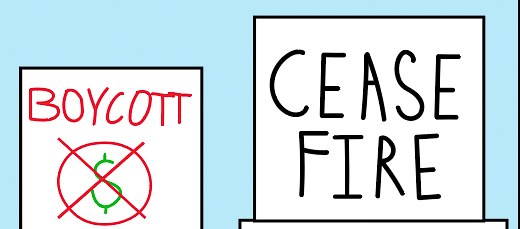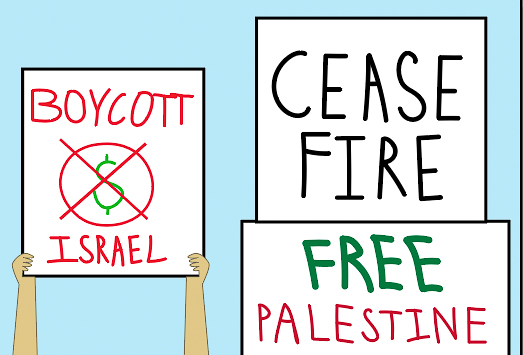Israel-Hamas War: Students connected to conflict speak out
Waukee HS students give their personal insights into the Israel-Hamas War and share solutions they believe in.
Share this story

On October 7, 2023, an Islamist terrorist group called Hamas issued a surprise attack on Israel, killing 1,200 people and taking 200 hostages. This has initiated a widespread massacre of Palestinian people by the Israeli forces in Gaza and the West Bank. As of January 21, 25,105 Palestinians have been killed in Gaza alone, with over 62,000 wounded, according to APNews.
Israeli Prime Minister Benjamin Netanyahu has rejected plans that would lead to Palestinian statehood, and South Africa has even filed a lawsuit against Israel, accusing Israel of violating the 1984 Genocide Convention.
The Biden Administration is currently backing Israel with both diplomatic and military aid, and this month, U.S. military forces have conducted strikes against Houthi military bases in Yemen. The current legislature is working on bills that would ban companies from boycotting Israel. We recommend that you check out this article for more regularly updated information from The Arrowhead staff.
With the world in turmoil, teens are witnessing a turning point in history, and have the right to educate themselves and speak out for what they believe is right. Though high schoolers are limited in their abilities to directly impact world issues, their voices can still influence and educate those who represent them.
Iowa is not unscathed by this warfare. Students here at Waukee have unique connections to the conflict overseas, and ideas about how to move forward.
Senior Aleena Ali is a Palestinian student activist who has family in Gaza and has chosen to speak to the Arrowhead about the genocide. Her other family members who live under the state of Israel have also been impacted by the warfare. “We have zero contact with them, because if they were posting, if they were contacting us, the Israeli government would be watching them and could send them to prison,” said Ali.
Aleena Ali mentioned that 24,000 Palestinians, including 10,000 children, have been killed in the genocide.“Gaza is the size of the district of Des Moines with more than 2.2 million people and the amount of bombing is more than Germany in World War II,” Ali said. “There has been 75 years of oppression.”
Ali further explained that Israel is looking to take over Gaza, the West Bank, parts of Lebanon, Jordan, Syria, and Egypt, to obtain what Zionists believe is their God-given land.
Iraqi cousins Sanarya Alobaidi and Mays Al Sharqi have given their points of view. “We are from Iraq, the reason we’re in America is because of war and because of U.S. involvement in a foreign war, so this has basically everything to do with us,” said Al Sharqi, a senior.
“We have family friends that live in the West Bank, but they’re still being affected by the war, which is crazy because Hamas is not active in the West Bank,” said Al Sharqi. For context, Gaza is around 58 miles away from the West Bank.
Alobaidi, a junior, shared the story of her Arabic tutor, whose husband was killed in a hospital bombing. “It left my tutor and her three kids all by themselves; they have nobody left, and it’s very hard for them,” Alobaidi Said.
Sophomore Sarah Medher expresses her compassion for her peers, “We share the same community. We’re all Muslim, so we believe that they’re our brothers and sisters in Islam, so if they’re hurt, then I feel like I’m hurt too,” said Medher.
These students have expressed skepticism and caution around how this conflict will influence their future interactions with politics, especially in regards to U.S. involvement and the Biden Administration’s support of Israel.
“I think this issue makes me more wary of who I trust and who I put my support into, especially in politics,” said Medher. “This issue shows me that it is important to look into what people are supporting and the ethics of such.”
Alobaidi conveys a similar sentiment of hopelessness surrounding the political efficacy of citizens voting in the upcoming presidential election. “I think right now there are not a lot of good options in voting,” she said. “There’s Democrats and Republicans, but in the end, they’re gonna do the same thing.”
Al Sharqi proposes a method that she learned while watching Majority Report, a political podcast. “Voting as a tool rather than self-expression,” she said. “(Is) the best way to push the needle slowly towards what you want.”
“Part of the stuff that I do politically is I go and protest; I post about the genocide,” Ali said. “My dad is actually a pretty big activist here and he sets up a bunch of organizations and demonstrations in Des Moines, we like to educate people so everybody has a better understanding of the whole situation.”
Ali, who will be able to vote in this next election, says that she will vote for a candidate who calls for a ceasefire and peace agreement.
Students propose solutions to the conflict, criticize the current Administration’s actions, and give insight into what youths want for all nations involved.
“What the US needs to do is immediately call for a permanent ceasefire, they need to stop their military aid to Israel,” said Ali. Ali acknowledges the NATO alliance the U.S. has with Israel and mentions that Gaza has oil that would bring money to the U.S. through Israel if the genocide were to result in the total occupation and claiming of the land. She also postulates that without U.S. involvement, Middle Eastern countries would be more incentivized to come to the aid of Palestine.
“It benefits the US to keep supporting them, unfortunately,” she said. “They don’t really care much about the moral value of Palestinian lives, even though they might say they do.”
Ali says that negotiations and a peace treaty are necessary resolutions to the war.
“I would like the US to fully evaluate the decisions they are making and truly think about who and what they are supporting and why,” said Medher.
Al Sharqi urges the U.S. to pull funding from Israel and acknowledge that Israel’s actions are wrong.
“What I support is a one-state solution,” said Al Sharqi. “A one-state solution, giving Palestinians back historic Palestine and letting the Israelis live there is probably the best solution.” Al Sharqi shows concern for the extent to which both sides will attack one another, expressing that she believes Israel will not stop if Hamas doesn’t stop, and vice versa.
Sanarya proposes a more specific way to deal with Hamas. “Right now, they’re using that (Hamas) as an excuse to do whatever they want to Palestinians,” said Alobaidi. “If we look at ISIS and what they did to get rid of ISIS, they sent special forces to get rid of ISIS, not bomb the place.”
Waukee students have similar takes on how to effectively advocate for change and show their support for Palestinians during these times. Boycotting, educating yourself, and being open to listening to others are a few actions that they have said to be the most impactful.
“Don’t go to Starbucks and don’t go to McDonalds,” said Alobaidi. “There are very many alternatives to everything that is supporting Israel.” Because certain companies support Israel, activists have urged people to boycott them. Starbucks and McDonalds are the major chain restaurants/coffeeshops that support Israel.
Sarah Medher says that posting on social media to bring attention to the issue and donating money to reputable causes are also ways to show support.
Ali speaks on the importance of education. “With a lack of proper information, going to demonstrations and posting online is very weak because you don’t know the situation enough to back it,” she said.
Ali recommends checking out the Eye On Palestine Instagram account, which shows live footage from Gaza, along with others such as Untold Palestine and PalestineRCS. She also recommends donating to the Palestinian Children’s Relief Fund (PCRF) and following Palestinian journalists and activists like Angelina Jolie who have spoken out against the genocide.
Though the issue is controversial, Waukee students have spoken out with bravery, despite the very real fear of being attacked for their identities and beliefs.
“It’s a little dangerous for me to speak out, but I still choose to, because I would rather die for this cause than stay silent,” said Ali.
While it may feel like we can only watch as the chaos unfolds, holding space for those who are impacted by the war, educating ourselves, and taking action against genocide, can make a difference.

